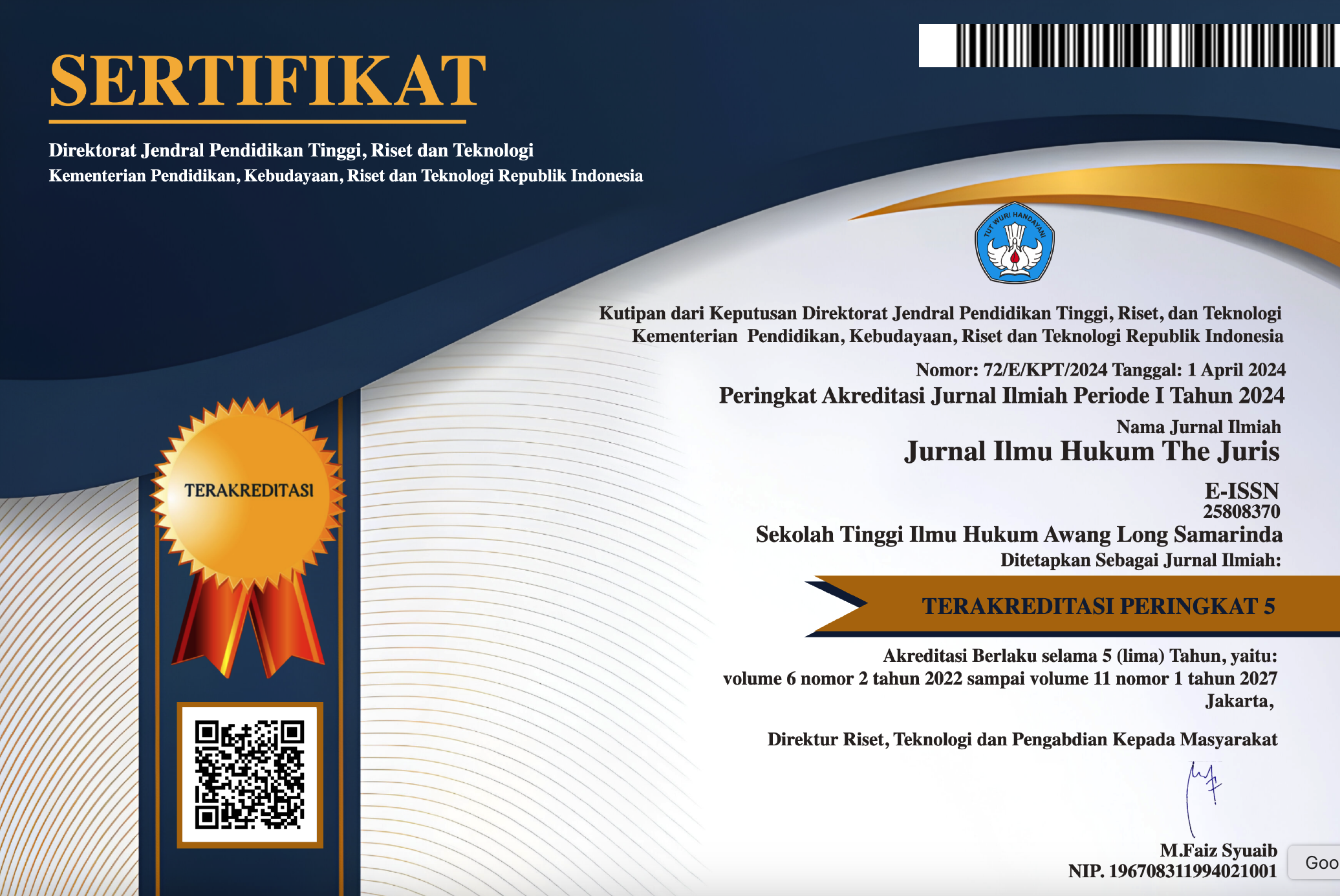ANALISIS KEADILAN RESTORATIF KEJAKSAAN DITINJAU DARI ASAS KEPASTIAN HUKUM
Abstract
This research aims to analyze the process of peace efforts based on restorative justice in the prosecutor's office which only stops at issuing a decree to terminate the prosecution. implementation of restorative justice implemented by the prosecutor's office which has not been able to comply with the principle of legal certainty. So far, the process of seeking peace at the prosecutor's office only stops with a letter of decision to terminate the prosecution, in which the representation of the prosecutor's office as a peacemaker only targets peace between the suspect and the victim. in other words, there is no target for fulfilling the responsibilities that should be given to victims. Legal certainty is a guarantee of certainty that the law is running well without any arbitrary action, which means that rights and obligations are fulfilled. If legal certainty is achieved then each party gets the same rights. This research uses a normative juridical method with a statutory regulatory approach and a conceptual approach. The results of this research explain that case resolution based on restorative justice in the prosecutor's office between perpetrators, victims and the prosecutor's office itself has not been able to fulfill the principle of legal certainty. This is because the prosecutor's efforts and pursuit are only to achieve peace, without considering the aspects of responsibility that must be fulfilled by the parties involved and bound. In the sense that Prosecutor's Regulation Number 15 of 2020 does not fulfill the principle of legal certainty.
Downloads
References
Andro Giovani Ginting, dkk, Restorative Justice sebagai Mekanisme Penyelesaian Tindak Pidana Kekerasan dalam Rumah Tangga, Jurnal Rectum, 2019.
Arief Nawawi Barda, Tujuan dan Pedoman Pemidanaan: Perspektif Pembaharuan dan Perbandingan Hukum Pidana, Pustaka Magister, Semarang, 2017.
Birthwaite John, Restorative justice and Responsive Regulation, University Press, Oxford, 2002
Braithwaite John, tt, Restorative Justice: Assessing An Immodest Theory And A Pessimistic Theory Draft To Be Submitted To Crime And Justice: Review Of Research, University Of Chicago, Press.
E. F, Andriyanti “Urgensitas Implementasi Restorative Justice Dalam Hukum Pidana Indonesia”, Jurnal Education and development, 2020.
Indiyani, k. D, “Penerapan Restorative Justice Sebagai Inovasi Penyelesaian Kasus Tindak Pidana Ringan”, jurnal Universitas Jember. (2021).
Kejati jatim, Jaksa Agung Muda Tindak Pidana Umum (JAM-Pidum) Menyetujui 13 Pengajuan Restorative Justice, diakses https://kejati-jatim.go.id/jaksa-agung-muda-tindak-pidana-umum-jam-pidum-menyetujui-13-pengajuan-restorative-justice/, pada tanggal 9 mei 2024, pukul 1.04.
Lokal, P.T., “Restorative Justice Kejaksaan”. Jurnal RechtsVinding, 2019.
Mahendra, Adam Prima, “Mediasi Penal Pada Tahap Penyidikan Berlandaskan Keadilan Restoratif”, Jurnal Jurist-Diction, 2020.
Mahmud Marzuki, Peter, Penelitian Hukum: Edisi revisi, Prenada Media, Jakarta, 2011.
Manan Bagir dan Magnar Kuntana. Beberapa Masalah Hukum Tata Negara, Bandung, PT. Alumni, 2017.
Peraturan Kejaksaan Nomor 15 Tahun 2020 (Perja No 15 Tahun 2020)
Peter Mahmud Marzuki, Penelitian Hukum, Cetakan ke-13 Edisi Revisi, Kencana, Jakarta, 2017.
Ridwan Mansyur, Mediasi Penal Terhadap Perkara KDRT (Kekerasan Dalam Rumah Tangga), Yayasan Gema Yustisia Indonesia, Jakarta, 2010.
Soekanto Soerjono dan Mamudji Sri, Penelitian Hukum Normatif: Suatu Tinjauan Singkat, PT. Raja Grafindo Persada, Jakarta, 2006.
Sunggono Bambang, Metode Penelitian Hukum, PT. Raja Grafindo Persada, Jakarta, 2015.
Undang-Undang Dasar Negara Republik Indonesia 1945 (UUD 1945)
Copyright (c) 2024 Grace Ndruru, Mardian Putra Frans

This work is licensed under a Creative Commons Attribution-ShareAlike 4.0 International License.







